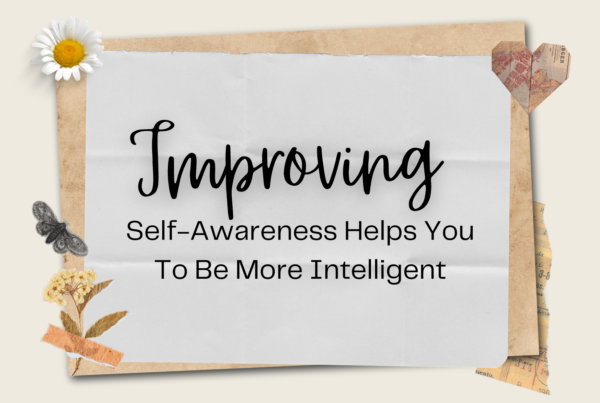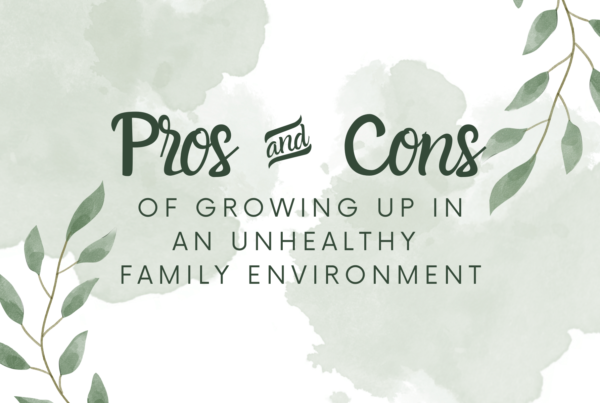Responsibility is a cornerstone of personal development and healthy relationships. It involves more than simply completing tasks; it encompasses owning up to our actions, learning from mistakes, and consistently demonstrating reliability.
In this blog post, we’ll delve into the importance of taking responsibility and outline practical steps to cultivate it in our day-to-day lives. We’ll also highlight the nuanced difference between taking responsibility and taking accountability.
Why talk about taking responsibility?
Taking responsibility is the difference between a powerful individual, who is in control of their life and a powerless individual who isn’t accountable for anything and lives out of control in their life.
If you want to be more self-confident in your life, I encourage you to fully take on focusing on taking responsibility in your life!
Jump To Section:
Responsibility and Accountability is There a Difference?
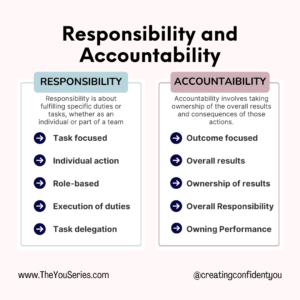 While responsibility and accountability are often used interchangeably, they carry distinct meanings.
While responsibility and accountability are often used interchangeably, they carry distinct meanings.
- Responsibility refers to the tasks or duties one is expected to perform. It’s about fulfilling commitments and doing what is expected of us.
- Accountability, on the other hand, takes responsibility a step further. It involves accepting the consequences, whether positive or negative, for the outcomes of those responsibilities. Accountability goes beyond just fulfilling tasks; it involves owning the results and taking responsibility for them.
Taking responsibility and taking accountability are both important qualities, and ideally, a person should possess both. They’re skill that you want to have to progress in your work life, relationships and community.
While they are related, they play distinct roles in personal and professional development.
The 3 Causes Of Irresponsibility:
I’m a firm believed that if we want to do better at something, first we must know what sets us back. Here are the 3 core things that stop anyone from taking responsibility. We’ve all done this at some in our lives. These are some of the ways that human beings tend to avoid taking responsibility in life.
1. Blaming others:
it’s never my fault. Someone else did it. Choosing to take no responsibility for your contribution. Often times people who are focused on blaming others, are insecure & never satisfied in their life.
2. Excuses:
Someone of something else stopped me for making it happen. Excuses have a lot of control over us. When we use excuses we have no control over ourselves.
3. Complaining:
Being dissatisfied about an experience that we most likely got ourselves into. You act as if someone forced you to do it but nobody forces you to do anything. Taking responsibility will allow you to see how you get into these situations you don’t desire. Sometimes you’ll sign up to attend an event. Then you’ll regret having to go as if someone forced you to go. Stop complaining about the thing and start to find solutions. What can you learn from the actions that you’ve taken in the past?
Pay attention to what you say, you’ll notice new patterns and ways of being that stop you from taking responsibility for things in your life.
They leave you feeling powerless, weak & out of control. Nobody does this to you as you do it to yourself.
Steps to Taking Responsibility
Taking responsibility is crucial because it promotes accountability and personal growth. It allows you to learn from your actions, build trust with others. Which contributes to a more positive and responsible community.
We also talk a lot about core values here and it’s important to keep in mind that taking responsibility helps to build trust in yourself.
I always recommend:
That my clients have “Taking responsibility”, “Being honest” or “Taking Accountability” as one of their core values. This just help you stay in check with your over all behavior in your life.
You are fully responsible for your life.. here is how!
- Firstly, it starts with your thoughts, every single thought you have creates some kind of emotion.
- Secondly, once your thoughts turn into emotions. Those emotions show on your face & way of being.
- Further, those thoughts & emotions become transformed through your words and into actions you take.
- Lastly, those thoughts, emotions, words, and actions are all 100% your responsibility… regardless of what other people say or do.
Is taking responsibility the power move you need?
If you’re ready to step in their power. Take their power back, then this is something you should begin to consider, start accepting in your life and begin to discover the level of responsibility you can take in your life.
As a result of FULL taking responsibility you’ll feel:
- Power: You’ll begin to experience a new type of power in your life.
- Control: You will feel like you have control over yourself. You are the only person or thing in this world that you can control. The only power we have over other people is only through influence. Influence is freeing and lets others choose their path.
- Creation: You’ll begin to notice that what you can create is unlimited.
- Clarity: You will be able to define and recognize a whole new reality in your life.
- New Direction: You’ll be able to guide your direction in life through intention.
Reflect, extract your lesson & set an intention:
Make sure to reflect:
Where you were out of alignment(to fully understand alignment it’s important that you do core value work). What is being in alignment for you? Your values & standards, considering other people’s values & standards. Have the self-awareness to notice what you could have done better & own where you stepped out of alignment. Pin point where you need to take responsibility.
Extract your lesson:
In every situation that presents a challenge for you, there is always a lesson that you can extract. This will prevent you from going in loops in your life. Always making the same mistake, never learning from your mistakes, and creating the same result again and again in your life.
Set an intention for the future:
7 Steps to taking responsibility in your life:
Now, let’s explore the concrete steps one can take to embrace responsibility:
1. Recognize the mistake:
Firstly, acknowledging our errors is the initial step towards responsibility. Taking a moment to understand what went wrong provides valuable insight into areas for improvement.
Have the self-awareness to notice what you could have done better & own where you stepped out of alignment.
2. Admit responsibility:
Ownership is key. Admitting our role in a situation without making excuses demonstrates integrity and a commitment to accountability.
3. Apologize:
Offering a sincere apology is a powerful way to bridge gaps caused by our actions. It shows empathy and a willingness to make amends. Have a conversation with the people that are involved.
Having a conversation with the people involved will help you and them feel complete about what happened.
This is so important because it will clean up your “Karma” and “Integrity”. Integrity is so important when it comes to being successful in life, you don’t want a community of people upset with you or gossiping about you, saying things like “Oh they don’t take any responsibility.
4. Learn from the experience:
Moving forward, mistakes become stepping stones for growth when we take the time to understand their root causes. Learning from experiences is an integral part of the responsibility journey.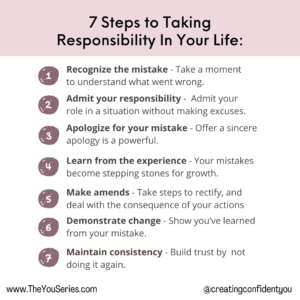
5. Make amends:
Responsibility involves more than words; it requires action. Taking steps to rectify or mitigate the consequences of our actions is a tangible way to demonstrate commitment to change.
6. Demonstrate change:
Consistency is key. Integrating lessons learned into our behavior and making positive choices over time reinforces the sincerity of our commitment to responsibility.
7. Maintain consistency:
Long-term responsibility involves a commitment to being reliable. Building trust requires ongoing effort, and maintaining consistency in our actions is fundamental to this process.
How To Apologize Once You've Taken Responsibility:
Apologies can vary based on the nature of the situation, but they generally share common elements such as acknowledging responsibility, expressing remorse, and outlining steps for improvement or restitution.
Here are some examples of apologies that reflect taking responsibility:
1. Simple apology example:
“I want to sincerely apologize for my actions and I take full responsibility for [specific behavior]. I understand the impact it had on you. I’m truly sorry.”
2. Acknowledging mistake example:
“I realize that I made a mistake, and I want to own up to it. I ‘m responsible for [describe the mistake], and I apologize for any inconvenience or hurt it may have caused.”
3. Expressing regret example:
“I deeply regret my actions and want to take full responsibility for them. I understand the hurt and frustration I may have caused, and I want you to know that I am truly sorry.”
4. Committing to change example:
“I acknowledge my responsibility in [the situation]. I want you to know that I am committed to making positive changes. I’ll [describe specific actions or changes] to ensure this doesn’t happen again.”
5. Understanding impact example:
“I want to apologize for my behavior and take full responsibility for it. I now realize the impact it had on you, and I am truly sorry. Moving forward, I am committed to [action or change].”
6. Empathetic apology example:
“I understand how my actions may have hurt you, and I want to sincerely apologize for that. I take full responsibility and want you to know that I empathize with your feelings.”
7. Making amends example:
“I take responsibility for [specific actions] and recognize the harm it caused. I’m am committed to making amends and will [outline steps or actions] to rectify the situation.”
Remember that a genuine apology not only acknowledges responsibility but also demonstrates a sincere intention to learn from the mistake and make positive changes.
It’s important to be specific, express empathy, and follow through on any commitments made during the apology.
Are you new here?
I also have the following content that focuses on helping you get out of your way, build confidence & guide you toward taking effortless action:
- CORE VALUES: Learn More About Your Personal Core Values
- Manifestation Is Logical, Not Magical. You Already Do It Daily On Autopilot!
- Defining What It Means To Take Responsibility In Your Life
- Top Tips On How To Successfully Start Setting Intentions That Work For You
- Reduce Regret And Turn Your Past Into Powerful Lessons Learned In Life
- 7 Inspirational Short Quotes About Life: That Call Out For Abundance
- What is Self-Love and Everything You Need to Know to Improve Self-Love
Build More Confidence:
- How Taking 100% Responsibility Will Give You More Confidence
- Top Self-Trust Tips That Increase Your Confidence
- The Ultimate Guide To Feeling Confident About Who You Are!
Build Better Relationships:
Dealing with Irresponsibility in Relationships
Transitioning to dealing with irresponsibility in relationships, it’s essential to set clear expectations, express concerns, and provide support where possible. However, if efforts to address the issue prove not to work out for you and the relationship poses harm or too much stress in your life, it might be necessary to evaluate and, if necessary, step away.
Dealing with irresponsibility in relationships can be challenging, but it’s essential to address the issue constructively. Here are some steps to help navigate through such situations:
1. Reflect on the impact:
Take a moment to assess how the irresponsibility is affecting the relationship. Consider both the emotional and practical implications of the behavior. Understanding the impact is crucial before addressing the issue.
2. Communicate openly:
Initiate an honest and open conversation about the observed irresponsibility. Use “I” statements to express your feelings and observations, focusing on the behavior rather than making personal attacks. Create a safe space for the other person to share their perspective as well.
3. Set clear boundaries:
Clearly articulate what your boundaries are regarding responsibilities and commitments in the relationship. Be specific about what actions or changes are needed to address the issue. Establishing clarity helps in avoiding misunderstandings.
4. Express concerns tactfully:
While addressing the problem, choose your words carefully to avoid sounding accusatory. Express your concerns tactfully, emphasizing that your intention is to strengthen the relationship rather than criticize.
5. Provide constructive feedback:
Offer feedback that is constructive and solution-oriented. Instead of dwelling solely on the problem, discuss potential solutions or compromises that could improve the situation. Collaborative problem-solving can foster a sense of shared responsibility.
6. Offer support:
This means that you need to be self-aware and have some empathy for the other person. Sometimes, when someone is not taking responsibility, it may stem from external factors such as stress or overwhelm. Offer your support and ask if there’s anything you can do to help. Demonstrating understanding and empathy can create a supportive environment.
7. Establish consequences:
Clearly outline the potential consequences of continued irresponsibility. This step is not meant to be punitive but rather to emphasize the importance of accountability. It provides a framework for understanding the gravity of the situation.
8. Reassess and adjust expectations:
Be open to reassessing and adjusting expectations based on the discussion. Sometimes, a compromise or a gradual adjustment in responsibilities can be a more realistic approach.
9. Seek professional guidance:
If the irresponsibility persists and significantly impacts the relationship, consider seeking the assistance of a relationship counselor, life coach or therapist. Professional guidance can provide additional insights and strategies for addressing the issue.
10 Evaluate the relationship:
After taking steps to address the irresponsibility, evaluate the overall health of the relationship. Assess whether the changes are sustainable and whether both parties are genuinely committed to making improvements. If necessary, be prepared to make difficult decisions regarding the future of the relationship.
Remember, every relationship is unique, and these steps may need to be adapted based on the specific dynamics and individuals involved. Open communication and a willingness to work together are essential components of addressing irresponsibility in relationships.
Cultivating Responsibility in Your Daily Life:
Shifting our focus to practical tips for day-to-day life, consider implementing the following strategies:
Keep causes of irresponsibility in check:
- Always check in to make sure that you’re not blaming other people for things that you should be looking into for yourself.
Commitments:
- Set clear goals and priorities to guide your actions.
- Create and stick to a schedule, fostering consistency.
- Break down tasks into manageable steps for easier execution.
Be Organized:
- Establish routines for key activities, providing structure.
- Stay organized in your living and working spaces to reduce stress.
- Learn to say no when needed, ensuring realistic commitments.
Reflect:
- Reflect regularly on your actions and decisions for continuous improvement.
Get support:
- Embrace accountability partners for mutual support.
- Talk to somebody for support and accountability. (Counsellor, Therapist, Life Coach)
In Conclusion
In conclusion, responsibility is not just a set of actions; it’s a mindset and a way of life. By embracing responsibility and understanding it’s difference to accountability.
You pave the way for personal growth, building stronger relationships, and living a more fulfilling life.

Julia Maria Nica
Build Confidence Coach
Julia grew up in Vancouver, B.C. She immigrated from Romania to Canada in the ’90s with her family. Julia decided to find her passion. Just like many women, she experienced her own self-image challenges. She came up with the idea of The YOU Series as a part of unraveling the pain of her life. Today she focuses on building The You Series, coaching her clients, and creating new content.



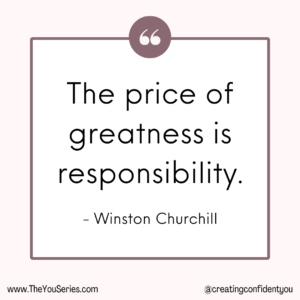 This is how I find what I’m responsible for in life. It’s the easiest way I could break down how your 100% responsible for your life.
This is how I find what I’m responsible for in life. It’s the easiest way I could break down how your 100% responsible for your life.





